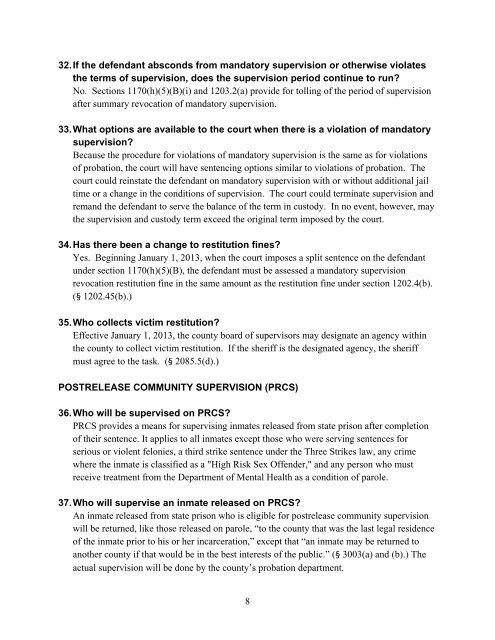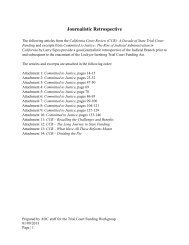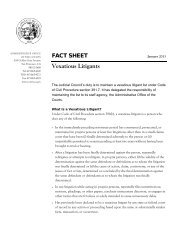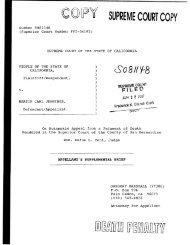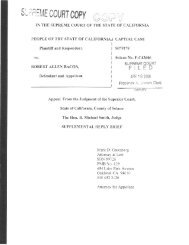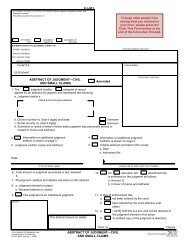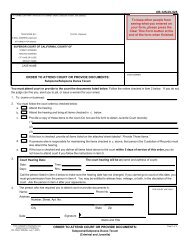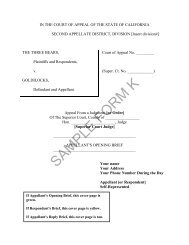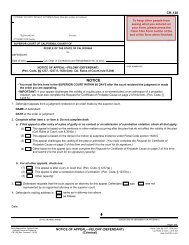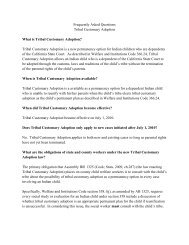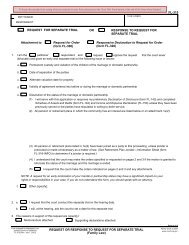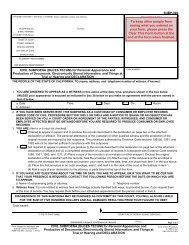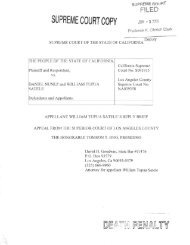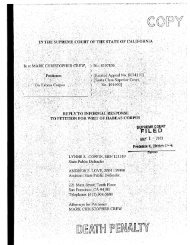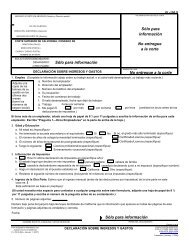2011 Criminal Justice Realignment Act ... - California Courts
2011 Criminal Justice Realignment Act ... - California Courts
2011 Criminal Justice Realignment Act ... - California Courts
You also want an ePaper? Increase the reach of your titles
YUMPU automatically turns print PDFs into web optimized ePapers that Google loves.
32. If the defendant absconds from mandatory supervision or otherwise violates<br />
the terms of supervision, does the supervision period continue to run?<br />
No. Sections 1170(h)(5)(B)(i) and 1203.2(a) provide for tolling of the period of supervision<br />
after summary revocation of mandatory supervision.<br />
33. What options are available to the court when there is a violation of mandatory<br />
supervision?<br />
Because the procedure for violations of mandatory supervision is the same as for violations<br />
of probation, the court will have sentencing options similar to violations of probation. The<br />
court could reinstate the defendant on mandatory supervision with or without additional jail<br />
time or a change in the conditions of supervision. The court could terminate supervision and<br />
remand the defendant to serve the balance of the term in custody. In no event, however, may<br />
the supervision and custody term exceed the original term imposed by the court.<br />
34. Has there been a change to restitution fines?<br />
Yes. Beginning January 1, 2013, when the court imposes a split sentence on the defendant<br />
under section 1170(h)(5)(B), the defendant must be assessed a mandatory supervision<br />
revocation restitution fine in the same amount as the restitution fine under section 1202.4(b).<br />
(§ 1202.45(b).)<br />
35. Who collects victim restitution?<br />
Effective January 1, 2013, the county board of supervisors may designate an agency within<br />
the county to collect victim restitution. If the sheriff is the designated agency, the sheriff<br />
must agree to the task. (§ 2085.5(d).)<br />
POSTRELEASE COMMUNITY SUPERVISION (PRCS)<br />
36. Who will be supervised on PRCS?<br />
PRCS provides a means for supervising inmates released from state prison after completion<br />
of their sentence. It applies to all inmates except those who were serving sentences for<br />
serious or violent felonies, a third strike sentence under the Three Strikes law, any crime<br />
where the inmate is classified as a "High Risk Sex Offender," and any person who must<br />
receive treatment from the Department of Mental Health as a condition of parole.<br />
37. Who will supervise an inmate released on PRCS?<br />
An inmate released from state prison who is eligible for postrelease community supervision<br />
will be returned, like those released on parole, “to the county that was the last legal residence<br />
of the inmate prior to his or her incarceration,” except that “an inmate may be returned to<br />
another county if that would be in the best interests of the public.” (§ 3003(a) and (b).) The<br />
actual supervision will be done by the county’s probation department.<br />
8


